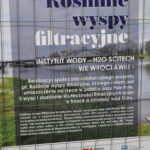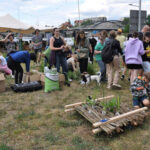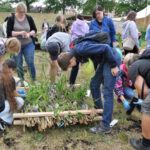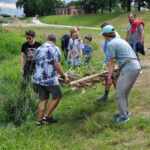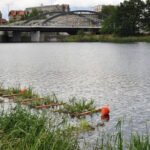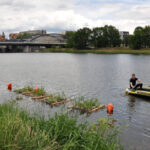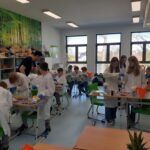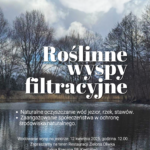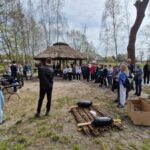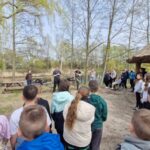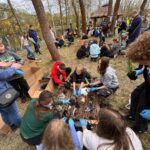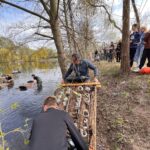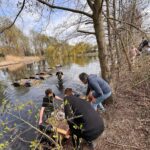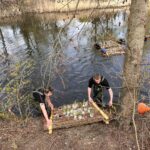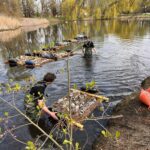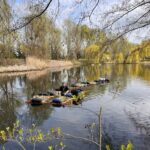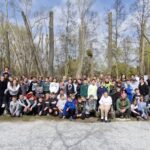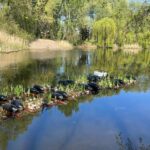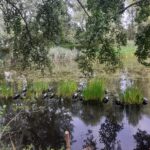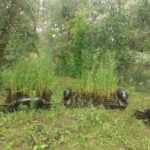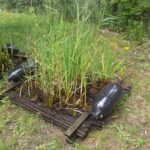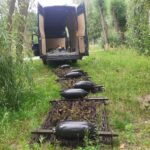Plant Filter Islands with Global Giving

Plants Filter Islands
Social impact on the natural aquastic environment
GlobalGiving is a nonprofit organization that supports other nonprofits by connecting them with donors and companies. Since 2002, it has been helping trusted, community-led organizations around the world access the tools, training and support they need to make our world a better place.
“Making the world a better place” and involving the community in this is also the goal of our Institute that works to protect the water environment and popularize new food production technologies. Shared values united the people of our organization and GlobalGiving and enabled the implementation of the „Plant Filtration Islands” project in March 2024.
The aim of the project was to activate the local community, non-governmental organizations and companies to engage in environmental protection — particularly to encourage the inhabitants of Wrocław to take actions that improve the state of water, including the Oder (Odra) River, on which the Wrocław city is built.
The project is an example of a grass-roots initiative presenting integration and equality of environments and generations in solving the problem of water pollution, including the Odra River, which we live on. The project included the development of a unique design of a filtration island, the construction of prototype islands, their launch on the river and the testing of their effectiveness in water purification.
Primary and secondary school students, teachers, company employees, and residents of Wrocław and the surrounding area were involved in the project activities. Together, using positive energy, knowledge and experience, we designed, built and moored 5 islands on the Odra River; all under the watchful eye of the team from our Institute.
Plants Filter Islands – How did we do it?
On 16 May 2024, we gathered at the 3M Company Conference Center to build five plant filter islands. Teams of “islanders” – students and teachers from primary and high schools in Wrocław (Szkoła Podstawowej nr 7, V Liceum Ogólnokształcące, XIV Liceum Ogólnokształcące), together with their parents and our Institute team – showed impressive creativity and dedication in building the platforms, which we then transported to the banks of the Oder.
Two days later, on May 18, the same group, joined by Wrocław residents, planted previously prepared plants on the islands and launched them on the Oder near the Mosty Warszawskie and the Psie Pole weir. The entire experience – from preparation to launch – was filled with joy, community spirit, and environmental purpose. Watching the islands drift was a moment of pride for all involved.
These activities fostered intergenerational cooperation and the creation of social bonds, proving that mutual respect, creativity, and commitment can lead to real change. Building social relationships, protecting the environment, and nurturing a sense of shared responsibility among residents were at the core of this unique experience.
Over the summer, we observed the islands closely, collecting water samples, tracking the growth of plants and monitoring their performance during changes in river water levels. Three months after the launch, despite high water levels and deep submersion, the plants continued to thrive. By mid-September, we prepared to retrieve the islands for further study, however, nature had its own plans. In early July, the islands unexpectedly submerged, damaging some of the plants. Fortunately, thanks to the mooring lines, we managed to retrieve them. Afterward, the plants regenerated, though their growth slowed significantly.
In September 2024, just days before their planned removal on September 17, we were alerted to a surge in the river. Acting swiftly on Sunday, September 15, and under challenging weather conditions, we successfully retrieved the islands and transported them to our laboratory. There, we conducted detailed research and analysis of the plant material and island effectiveness.
With this, we concluded the first phase of the 'Plant Filter Islands’ project. The results of our work, including environmental, social and educational aspects, have been compiled into a Final Report, which were published in November 2024.
Download the Final Report (below):
We are grateful to GlobalGiving for trusting our vision and to Państwowe Gospodarstwo Wodne Wody Polskie, 3M Company, and all involved partners for their support throughout this journey. Special thanks to the youth, children, teachers, school directors, and residents of Wrocław whose involvement made this initiative possible!
The collective effort, creativity, and knowledge-sharing of all project participants proved how impactful grassroots environmental projects can be. It also contributed to increased ecological awareness and a stronger sense of responsibility for our shared water resources.
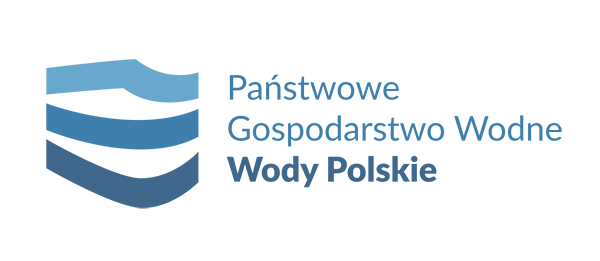
Check out the gallery showing the entire duration of the project:

Plants Filter Islands – 2nd Edition
Natural purification of water by plants and protection of reservoirs against pollution from farms and agriculture
The second edition of the „Plant Filter Islands” project focused on the natural purification of water through the use of specially selected plant species, placed on floating platforms, and on protecting water reservoirs from pollution originating from conventional agriculture and livestock farming.
Conventional farming practices using synthetic fertilizers help increase food production but often lead to unintended environmental consequences – such as soil degradation and contamination of rivers, ponds and lakes. Runoff containing nitrogen and phosphorus harms biodiversity, reduces fish populations, and disrupts aquatic ecosystems.
The first stage of the project, conducted in March 2025, involved a series of environmental education workshops in schools in the Municipality of Długołęka. Students from primary schools in Brzezia Łąka, Wilczyce, Kiełczów, Borowa and Długołęka, as well as the High School in Długołęka, participated in classes covering the sources of water pollution, especially from fertilizers, and learned about methods of natural water purification. Children and youth carried out experiments to observe how fertilizer runoff affects water quality, giving them hands-on experience and a deeper understanding of the need for sustainable agriculture and local ecological responsibility.
In early April 2025, after the educational and experimental phase, the participants – students, teachers and parents – joined technical workshops held at 3M’s headquarters in Wrocław. Together, they constructed floating platforms, planting on them species of plants known for their filtration properties.
On April 12, 2025, a community event was held in Kiełczów, on the lake located on the premises of the ‘Zielona Oliwka’ restaurant. Residents of villages and towns, together with families, students and local leaders, gathered to launch the plant filter islands. The friendly atmosphere confirmed how ecological initiatives can unite generations and communities in practical efforts to protect the local environment.
After placement on the lake, the islands were observed throughout the spring and early summer. Despite challenging weather, the plants reached a sufficient growth stage for material collection. In addition to plant samples, sensor data measuring pollution levels in the water were gathered. The islands once again became a habitat for aquatic life such as crayfish, snails and other organisms, confirming their ecological benefit!
At the end of September, the Water Institute team completed the analysis of the collected data and prepared a final report summarising the effectiveness of natural filtration methods. The results provide a valuable basis for the development of systemic solutions for the purification of water reservoirs and further environmental education programmes.
Download the Final Report below:
While awareness about environmental protection in rural areas is still limited, this project proves that grassroots initiatives can have real impact. By involving children, youth, teachers, parents and local authorities, we not only test effective ecological solutions but also build a shared responsibility for our natural surroundings.
“Plant Filter Islands” is an example of how nature, science and community involvement can come together to protect what matters most – clean water and a healthy environment for future generations.
Check out the gallery showing the entire duration of the project:

